Progressive rock says goodbye to a key figure for the genre: Peter Sinfield
Goodbye Peter Sinfield , rest in peace. A key figure for the world progressive rock genre is leaving us, from its first steps to the present day.
The most curious thing of all is that Sinfield was not actually a musician as such in our minds. Although it is true that he knew how to play guitar and other instruments, he was a renowned producer , lyricist and creator of ideas for other bands, being key to the first stage of King Crimson and later for other important bands such as ELP (Emerson, Lake & Palmer). and PFM (Premiata Forneria Marconi).
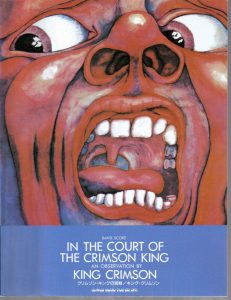
Best Sheet Music download from our Library.
Who was Peter Sinfield?
The artist, poet and singer-songwriter, who used to sign himself simply as ‘Pete’, has passed away at the age of 80 after a legendary career in good music. At the end of the 1960s he helped found King Crimson, being marked by art rock and high-level music.
Peter John Sinfield (27 December 1943 – 14 November 2024) was an English poet and songwriter. He was best known as a co-founder and lyricist of King Crimson. Their debut album In the Court of the Crimson King was considered one of the first and most influential progressive rock albums ever released.
Sinfield’s lyrics are known for their surreal imagery, often involving common fantasy concepts, nature, or the sea. They often also deal with emotional concepts and, sometimes, storyline concepts. Later in his career, he adapted his songwriting to better suit pop music, and wrote a number of successful songs for artists such as Celine Dion, Cher, Cliff Richard, Leo Sayer, Five Star, and Bucks Fizz.
In 2005, Sinfield was referred to as a “prog rock hero” in Q magazine for his lyrical work and influence in the music industry.
Although over the years he had to earn money by composing lyrics for all types of genres, such as writing for the renowned pop artist Céline Dion.
Before, he was key in the first King Crimson, a group that has now remembered him in his farewell: “He was an original roadie, lyricist, lighting operator and live sound engineer.”

Please, subscribe to our Library.
If you are already a subscriber, please, check our NEW SCORES’ page every month for new sheet music. THANK YOU!
Pete Sinfield “Seagoat” on The Old Grey Whistle Test 1973
In her itinerant, bohemian youth, she spent time in Spain and Morocco, later working with Robert Fripp at King Crimson over the years.
It all started with a previous collaboration with Ian McDonald, a musician who worked with the band Giles, Giles & Fripp, the seed of the later Crimson. Sinfield signed as co-producer and lyricist of the group’s first 4 albums, the legendary ‘In the Court of the Crimson King’, ‘In the Wake of Poseidon’, ‘Lizard’ and ‘Islands’, between 1969 and 1971, hence the key importance for the progressive genre.
His most remembered lyrics will undoubtedly be those of ’21st Century Schizoid Man’ against the Vietnam War, as well as the melancholic ‘Epitaph’: “Confusion will be my epitaph, as I wander along a broken and devastated road…”.
After King Crimson
After leaving Crimson, at the request of Fripp, a well-known ‘contract breaker’ to burn through stages and start from scratch, he signed for Roxy Music, being on his debut album. He then recorded his only solo album, ‘Still’, with a band that included Greg Lake , formerly of King Crimson.
In fact, that friendship and close relationship with Lake led him to work with Emerson, Lake & Palmer on ‘Brain Salad Surgery’ (1973) and especially with Lake alone, being the lyricist of the popular song ‘I Believe in Father Christmas’ , which was an international hit for years.
In 1973 he went on to help another progressive band, the Italian Premiata Forneria Marconi (PFM) , producing their albums ‘Photos of Ghosts’ and The World Became the World’.
Beyond the progressive universe, he has collaborated with Gary Brooker of Procol Harum, Abba, Cher, Five Star … But without a doubt his greatest commercial success was the lyrics of the song ‘Think Twice’ by Céline Dion, from 1994.

Pete Sinfield “House of Hopes and Dreams” on Old Grey Whistle Test 1973
Pete Sinfield singing “House of Hopes and Dreams” from his album “Still” on the Old Grey Whistle Test in 1973.
What is the Progressive rock?
Progressive rock (shortened as prog rock or simply prog) is a broad genre of rock music that primarily developed in the United Kingdom through the mid- to late 1960s, peaking in the early-to-mid 1970s. Initially termed “progressive pop”, the style was an emergence of psychedelic bands who abandoned standard pop traditions in favour of instrumentation and compositional techniques more frequently associated with jazz, folk, or classical music. Additional elements contributed to its “progressive” label: lyrics were more poetic, technology was harnessed for new sounds, music approached the condition of “art”, and the studio, rather than the stage, became the focus of musical activity, which often involved creating music for listening rather than dancing.
Progressive rock is based on fusions of styles, approaches and genres, involving a continuous move between formalism and eclecticism. Due to its historical reception, the scope of progressive rock is sometimes limited to a stereotype of long solos, long albums, fantasy lyrics, grandiose stage sets and costumes, and an obsessive dedication to technical skill. While the genre is often cited for its merging of high culture and low culture, few artists incorporated literal classical themes in their work to any great degree, and only a handful of groups, such as Emerson, Lake & Palmer and Renaissance, purposely emulated or referenced classical music.
The genre coincided with the mid-1960s economic boom that allowed record labels to allocate more creative control to their artists, as well as the new journalistic division between “pop” and “rock” that lent generic significance to both terms. It saw a high level of popularity in the early-to-mid-1970s, but faded soon after. Conventional wisdom holds that the rise of punk rock caused this, but several more factors contributed to the decline.
Music critics, who often labelled the concepts as “pretentious” and the sounds as “pompous” and “overblown”, tended to be hostile towards the genre or to completely ignore it.
After the late 1970s, progressive rock fragmented in numerous forms. Some bands achieved commercial success well into the 1980s (albeit with changed lineups and more compact song structures) or crossed into symphonic pop, arena rock, or new wave.
Early groups who exhibited progressive features are retroactively described as “proto-prog”. The Canterbury scene, originating in the late 1960s, denotes a subset of progressive rock bands who emphasised the use of wind instruments, complex chord changes and long improvisations.
Rock in Opposition, from the late 1970s, was more avant-garde, and when combined with the Canterbury style, created avant-prog. In the 1980s, a new subgenre, neo-prog, enjoyed some commercial success, although it was also accused of being derivative and lacking in innovation. Post-progressive draws upon newer developments in popular music and the avant-garde since the mid-1970s.
King Crimson
King Crimson were an English-based progressive rock band formed in London in 1968. Led by guitarist Robert Fripp, they drew inspiration from a wide variety of music, incorporating elements of classical, jazz, folk, heavy metal, gamelan, blues, industrial, electronic, experimental music and new wave. They exerted a strong influence on the early 1970s progressive rock movement, including on contemporaries such as Yes and Genesis, and continue to inspire subsequent generations of artists across multiple genres. The band has earned a large cult following, especially in the 21st century.
Founded by Fripp, Michael Giles, Greg Lake, Ian McDonald and Peter Sinfield, the band initially focused on a dramatic sound layered with Mellotron, McDonald’s saxophone and flute, Giles’ complex and polyrhythmic drumming, Fripp’s atmospheric guitar sound, and Lake’s bass and powerful lead vocals, with gothic lyricism by Sinfield and creative directions by all members of the band. Their debut album, In the Court of the Crimson King (1969), remains their most commercially successful and influential release, with a potent mixture of jazz, classical and experimental music.
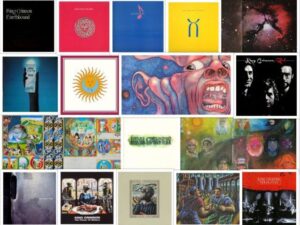
Following the sudden simultaneous departures of McDonald and Giles (with Lake leaving very shortly afterwards), the next two albums, In the Wake of Poseidon and Lizard (both 1970), were recorded during a period of instability in the band’s line-up. A settled band of Fripp, Sinfield, Mel Collins, Boz Burrell and Ian Wallace recorded Islands in 1971, though in mid-1972, Fripp let go of this line-up and changed the group’s instrumentation and approach, drawing from European free improvisation and developing ever more complex compositions. With Bill Bruford (formerly of Yes), John Wetton, David Cross, and briefly Jamie Muir, they reached what some saw as a creative peak on Larks’ Tongues in Aspic (1973), Starless and Bible Black (1974), and Red (1974). King Crimson disbanded at the end of 1974.
“I Talk to the Wind“
“I Talk to the Wind” is the second track from the British progressive rock band King Crimson’s debut album, In the Court of the Crimson King (1969).
Lyrics:
Said the straight man to the late man
Where have you been?
I’ve been here and I’ve been there
And I’ve been in between
I talk to the wind
My words are all carried away
I talk to the wind
The wind does not hear
The wind cannot hear
I’m on the outside looking inside
What do I see?
Much confusion, disillusion
All around me
I talk to the wind
My words are all carried away
I talk to the wind
The wind does not hear
The wind cannot hear
You don’t possess me
Don’t impress me
Just upset my mind
Can’t instruct me or conduct me
Just use up my time
I talk to the wind
My words are all carried away
I talk to the wind
The wind does not hear
The wind cannot hear
I talk to the wind
My words are all carried away
I talk to the wind
The wind does not hear
The wind cannot hear
Said the straight man to the late man
Where have you been?
I’ve been here and I’ve been there and
I’ve been in between
King Crimson – I Talk To The Wind
Robert Fripp–guitar Ian McDonald–reeds, woodwind, vibes, keyboards, mellotron, vocals Greg Lake–bass guitar, lead vocals Michael Giles–drums, percussion, vocals Peter Sinfield–words and illumination
Browse in the Library:
| Artist or Composer / Score name | Cover | List of Contents |
|---|---|---|
| Will B. Morrison – Melody in F (Syncopated Waltz) sheet music |
 |
|
| Will Young – Anything Is Possible | ||
| William Best I Love You For Sentimental Reasons (Jazz Standard) | William Best I Love You For Sentimental Reasons (Jazz Standard) | |
| William Eveleth – Blues Jazz and Rock Riffs For Keyboards |
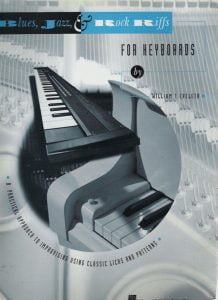 |
|
| William Gillock In Old Vienna Musescore File.mscz | ||
| William Gillock Valse Etude In Romantic Style Musescore File.mscz | ||
| William Joseph – Within (Songbook) (William Joseph) |
 |
William Joseph – Within (Songbook) (William Joseph) |
| William Robinson – My Girl | ||
| William Russo Composing Music A New Approach (ebook) |
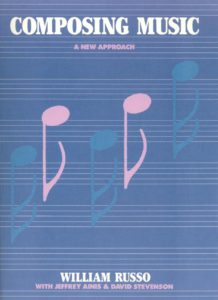 |
|
| Willie Dixon Preacher Of The Blues (2011) Mitsutoshi Inaba (Book) Biography |
 |
|
| Willie Fugal S Blues Piano transcription |
 |
|
| Willie Nelson – Always on My Mind Sheet Music |
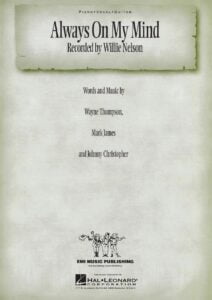 |
|
| Willie Nelson – On My Mind | ||
| Willie The Lion Smith – Finger Buster transcription |
 |
|
| Willie The Lion Smith Echo of Spring transcription |
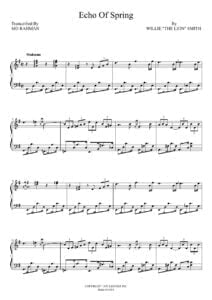 |
|
| Willow Weep For Me Words And Music By Ann Ronell 1932 Jazz Standard (Vintage sheet music) |
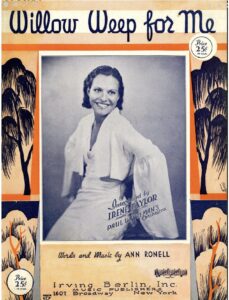 |
|
| Wim Mertens – American Minimal Music La Monte Young Terry Riley Steve Reich Philip Glass |
 |
Book La Monte Young Terry Riley Steve Reich Philip Glass |
| Wim Mertens – Close Cover | Wim Mertens – Close Cover | |
| Wim Mertens – Struggle For Pleasure | Wim Mertens – Struggle For Pleasure | |
| Wim Mertens – Time Passing |
 |
|
| Wim Mertens Humility |
 |
|
| Wim Mertens Lir |
 |
|
| Windham Hill piano sampler |
 |
Windham Hill piano sampler |
| Windy Whistle (Le Renard et l’Enfant OST) Alice Lewis | ||
| Wings (McCartney) – Greatest Hits |
 |
Wings sheet music |
| Winifred Atwell Album Of Rags No 1 Original arrangements Vintage songbook |
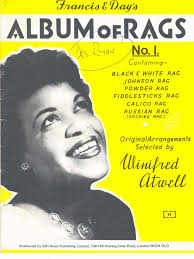 |
Winifred Atwell Album Of Rags No 1 Original arrangements Vintage songbook |
| Winifred Atwell Marguerite Monnot The Poor People Of Paris ( La Goualante Du Pauvre Jean) Piano Solo |
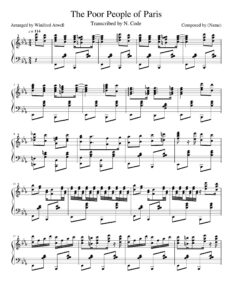 |
|
| Winnie The Pooh The Honey Tree Sheet Music (Disney) |
 |
Winnie The Pooh The Honey Tree Sheet Music (Disney) |
| Winter Sonata O.S.T. (Ryu) | ||
| Winter Wonderland Other Christmas Favorites Songbook Piano Vocal guitar Chords |
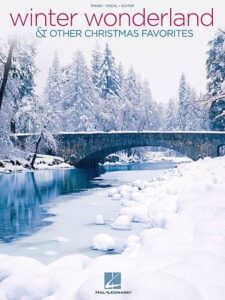 |
Winter Wonderland and Other Christmas Favorites Songbook Piano Vocal guitar Chords |
| Wish You Were Here – Pink Floyd (Musescore File).mscz | ||
| Within Temptation – Our Solemn Hour | ||
| Without you (Maria Carey) | ||
| Without You (Mariah Carey Piano Arr ) (Musescore File).mscz | ||
| Wiz Khalifa & Charlie Puth See You Again (Solo Piano) |
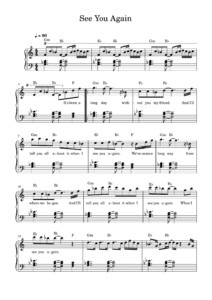 |
|
| Wolf Wagner Paraphrase Über Die Walküre |
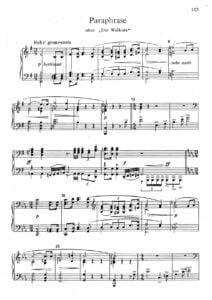 |
|
| Wolfe Richard Legit Professional Fake Book More Than 1010 Songs |
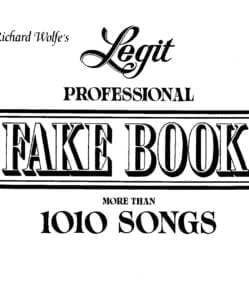 |
Wolfe Richard Legit Professional Fake Book More Than 1010 Songs |
| Wolfenzon – Stücke für Klavier | Wolfenzon – Stücke für Klavier | |
| Womack, Bobby – Midnight Mover My Autobiography The True Story of the Greatest Soul Singer in the World (Book) |
 |
|
| Woman in love (Barbra Streisand) | ||
| Women Of Pop Rock Songbook Twenty-Two Hot Hits for Easy Piano |
 |
Women Of Pop Rock Songbook Twenty-Two Hot Hits for Easy Piano |
| Wonderful Christmastime -Paul Mccartney (Wings) (Musescore File).mscz | ||
| Wonderful Life – Black (Easy Piano Solo Sheet Music) (Musescore File).mscz | ||
| Woody Allen – A propósito de nada (autobiografía)(2020) |
 |
|
| Woody Allen – Apropos of Nothing (2020) Autobiography | Woody Allen – Apropos of Nothing-Simon and Schuster (2020) Cover | |
| Woody Guthrie This Land Is Your Land (Easy and Intermediate Piano Solo) |
 |
|
| World Hits Of Jazz Standard |
 |
World Hits Of Jazz Standard |
| Wuthering Heights (Ryuichi Sakamoto) | ||
| Wynton Kelly – Autumn Leaves Solo transcription | Wynton Kelly – Autumn Leaves Solo transcription | |
| Wynton Kelly – Dark Eyes Solo Piano transcription |
 |
|
| Wynton Kelly – Dark Eyes Solo Piano Transcription (Musescore File).mscz | ||
| Wynton Kelly – Full transcriptions | Wynton Kelly – Full transcriptions | |
| Wynton Kelly – I Dig of You Solo transcription |
 |
|
| Wynton Kelly – If I should Love You Solo transcription |
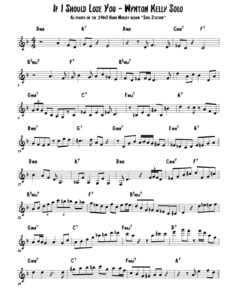 |
|
| Wynton Kelly – Jazz Piano Collection |
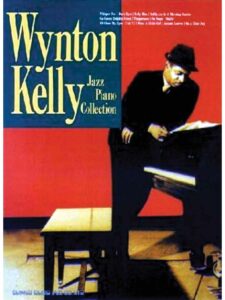 |
Wynton Kelly Piano Collection- |
| Wynton Kelly – Someday my prince will come (Piano solo) |
 |
|
| Wynton Marsalis Trumpet Genius Gourse, Leslie (Book) |
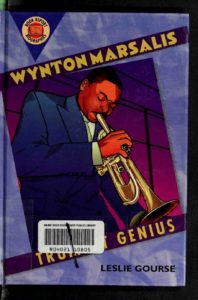 |
|
| Wynton Marsalis – Caravan (Solo) |
 |
|
| Wynton Marsalis – Darn That Dream (Solo) | Wynton Marsalis – Darn That Dream (Solo) | |
| Wynton Marsalis – Dealfayos Dillema (Solo) |
 |
|
| Wynton Marsalis – Standards (sheet music transcriptions) |
 |
Wynton Marsales – Standards (sheet music transcriptions) |
| Wynton Marsalis In The Court Of King Oliver (Trumpet and rhythm section) |
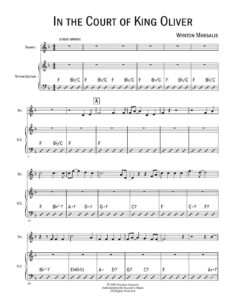 |
|
| Wynton Marsalis Omnibook For B Flat Instruments Transcribed exactly from his recorded solos |
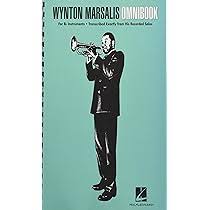 |
Wynton Marsalis Omnibook For B Flat Instruments Transcribed exactly from his recorded solos |
| Wynton Marsalis Struttin’ With Some Barbeque (Live) Wynton Marsalis’ Trumpet Solo |
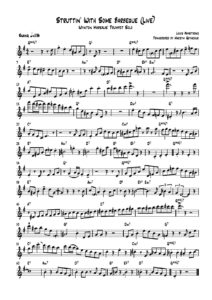 |
|
| Xenoblade Chronicles 2 Loneliness Kenji Hiramatsu | Xenoblade Chronicles Opening Theme Game sheet music | |
| Xenoblade Chronicles Opening Theme Game sheet music Yoko Shimomura |
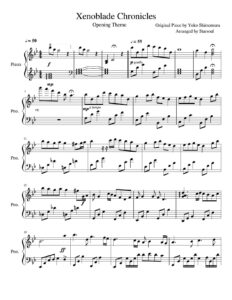 |
|
| Yamaha E443 Songbook digital keyboard PSR-E443 |
 |
|
| Yamaha Keyboard Songbook |
 |
Yamaha Keyboard Songbook |
| Yamaha Keyboard Songbook Song-Buch |
 |
|
| Yamaha PSR E373 YPT-370 PSR-EW310 Song book |
 |
|
| Yamaha Song Book |
 |
Yamaha Song Book |
| Yamaha Song book |
 |
Yamaha Songbook |
| Yamaha Songbook |
 |
Yamaha-Songbook |
| Yamaha songbook 50 Piano Greats for the piano (Yamaha collection) |
 |
50 Piano Greats for the piano (Yamaha collection) |
| Yamaha Songbook Contemporary Vol. 1 |
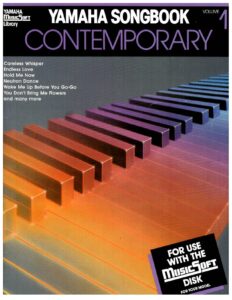 |
Yamaha Songbook Contemporary Vol. 1 |
| Yana Bobalik Mysterious Music Я.Бобалік Songbook |
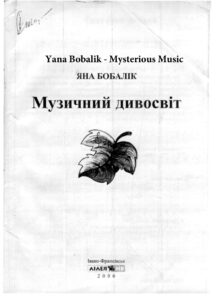 |
|
| Yana Bobalik Secret Music From Mysterious Music Я.Бобалік Таемна Музыка |
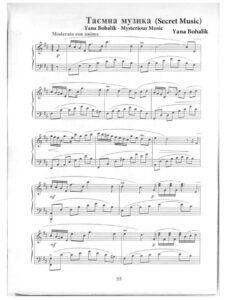 |
|
| Yann Tiersen Rue des Cascades (sheet music) | yann tiersen cascades sheet-music | |
| Yann Tiersen Mother’s Journey |
 |
|
| Yann Tiersen – Tabarly Sheet Music |
 |
|
| Yann Tiersen – Comptine Dun Autre ete | ||
| Yann Tiersen – La Dispute – Amelie Poulain | ||
| Yann Tiersen – La Valse d’Amelie Poulain | Yann Tiersen – La Valse Damelie | |
| Yann Tiersen – Le moulin – Amelie Poulain | Le Moulin – Amelie Poulain | |
| Yann Tiersen – Six pièces pour piano – Volume 2 – Amélie Poulain |
 |
Yann Tiersen – Six pieces pour piano – Volume 2 – Music Sheet |
| Yann Tiersen – Summer 78 | ||
| Yann Tiersen – Sur Le Fil |
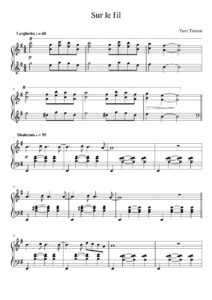 |
|
| Yann Tiersen – Pièces pour piano vol 1 et 2 + divers |
 |
Yann Tiersen – pièces pour piano vol 1 et 2 + divers  |
| Yann Tiersen Eusa 2015 Songbook |
 |
|
| Yann Tiersen J’Y Suis Jamais Alle piano solo (Amélie) |
 |
|
| Yann Tiersen Onze Pièces Pour Piano |
 |
Yann Tiersen Onze Pièces Pour Piano |
| Yann Tiersen Partitions intégrales Piano Works 1993-2004 | Yann Tiersen Partitions intégrales Piano Works 1993-2004 | |
| Yann Tiersen Tabarly Complete Book For Piano |
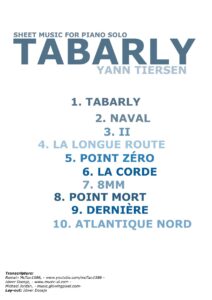 |
|
| Yanni In My Time (Piano Solos) Sheet Music |
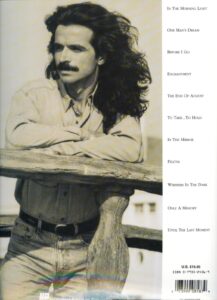 |
Yanni In my time piano solos |
| Yanni One Man’s Dream |
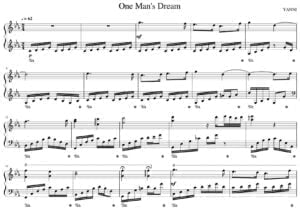 |
|
| Yanni – Per Piano (Piano book) |
 |
Yanni – Per Piano |
| Yanni – In The Morning Light | ||
| Yanni – Nostalgia | ||
| Yanni – One Man’s Dream (Musescore File).mscz | ||
| Yanni -The Best of |
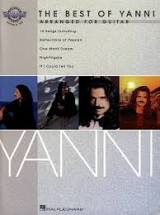 |
 |
| Yanni Ethnicity Book |
 |
Yanni Ethnicity Book |
| Yaron Herman – Hallelujah (Leonard Cohen) transcription |
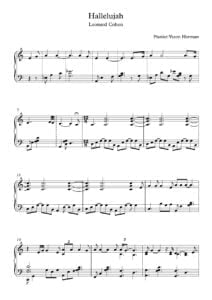 |
|
| Yashal (Elisa) | ||
| Yasuharu Takanashi – Naruto Shippuden OST – Loneliness |
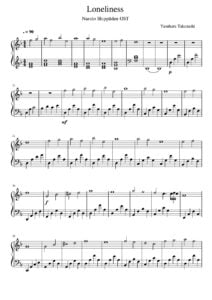 |
|
| Yedidia, Ronn Piano Sonata No 3 outcries (manuscrit) |
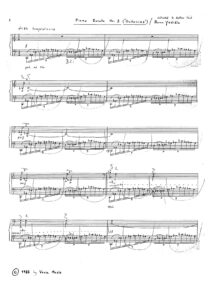 |
|
| Yehezkel Raz Ballerina Piano Solo sheet music |
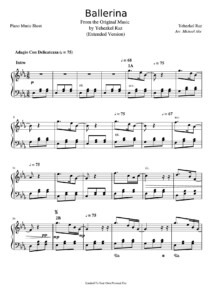 |
|
| YES Fragile |
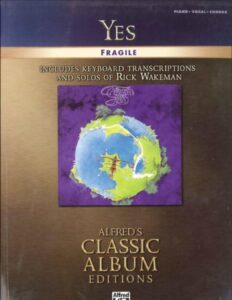 |
YES Fragile |
| YES – Complete Deluxe Edition |
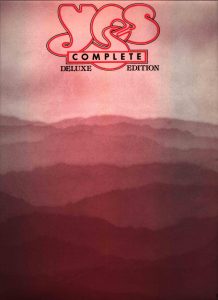 |
YES – Complete Deluxe Edition |
| Yes Close To The Edge The Story Of Yes (Book) |
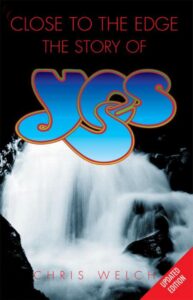 |
|
| Yes The Best Of Guitar Songbook with TABs |
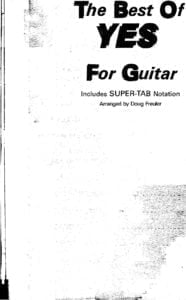 |
Yes The Best Of Guitar Songbook |
| Yesterday Piano Cello – Piano Sheet Music – Paul McCartney |
 |
|
| Yesterday Piano vocal guitar Songbook Featuring Music From the OST |
 |
|
| Yesterday The Beatles For Jazz Piano (Musescore File).mscz | ||
| Yesterday when I was young (Charles Aznavour) | ||
| Yimkin Law ( Et maintenant on va où OST) Racha Rizk | ||
| Yiruma – 27 May | ||
| Yiruma – Destiny Of Love | ||
| Yiruma – Dream | ||
| Yiruma – Dream A Little Dream Of Me | Yiruma – Dream A Little Dream Of Me | |
| Yiruma – Falling |
